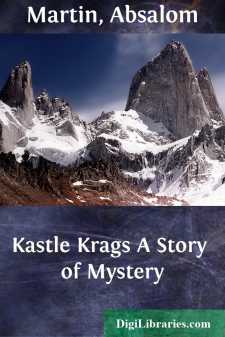Categories
- Antiques & Collectibles 13
- Architecture 36
- Art 48
- Bibles 22
- Biography & Autobiography 813
- Body, Mind & Spirit 142
- Business & Economics 28
- Children's Books 14
- Children's Fiction 11
- Computers 4
- Cooking 94
- Crafts & Hobbies 4
- Drama 346
- Education 46
- Family & Relationships 57
- Fiction 11829
- Games 19
- Gardening 17
- Health & Fitness 34
- History 1377
- House & Home 1
- Humor 147
- Juvenile Fiction 1873
- Juvenile Nonfiction 202
- Language Arts & Disciplines 88
- Law 16
- Literary Collections 686
- Literary Criticism 179
- Mathematics 13
- Medical 41
- Music 40
- Nature 179
- Non-Classifiable 1768
- Performing Arts 7
- Periodicals 1453
- Philosophy 64
- Photography 2
- Poetry 896
- Political Science 203
- Psychology 42
- Reference 154
- Religion 513
- Science 126
- Self-Help 84
- Social Science 81
- Sports & Recreation 34
- Study Aids 3
- Technology & Engineering 59
- Transportation 23
- Travel 463
- True Crime 29
Kastle Krags A Story of Mystery
by: Absalom Martin
Description:
Excerpt
CHAPTER I
Who could forget the Ochakee River, and the valley through which it flows! The river itself rises in one of those lost and nameless lakes in the Floridan central ridge, then is hidden at once in the live oak and cypress forests that creep inland from the coasts. But it can never be said truly to flow. Over the billiard-table flatness of that land it moves so slowly and silently that it gives the effect of a lake stirred by the wind. These dark waters, and the moss-draped woodlands through which they move, are the especial treasure-field and delight of the naturalist and scientist from the great universities of the North.
It is a lost river; and it is still a common thing to see a brown, lifeless, floating log suddenly flash, strike, and galvanize into a diving alligator. The manatee, that grotesque, hair-lipped caricature of a sea-lion, still paddles in the lower waters; and the great gar, who could remember, if he would, the days when the nightmare wings of the pterodactyls whipped and hummed over his native waters, makes deadly hunting-trips up and down the stream, sword-like jaws all set and ready; and all manner of smaller fry offer pleasing possibilities to the sportsmen. The water-fowl swarm in countless numbers: fleet-winged travelers such as ducks and geese, long-legged dignitaries of the crane and heron tribe, gay-colored birds that flash by and out of sight before the eye can identify them, and bitterns, like town-criers, booming the river news for miles up and down the shores. And of course the little perchers are past all counting in the arching trees of the river-bank.
In the forests the fleet, under-sized Floridan deer is watchful and furtive because of the activities of that tawny killer, the “catamount” of the frontier; and the black bear sometimes grunts and soliloquizes and gobbles persimmons in the thickets. The lynx that mews in the twilight, the raccoon that creeps like a furtive shadow through the velvet darkness, the pink-nosed ’possum that can only sleep when danger threatens, and such lesser folk as rabbit and squirrel, weasel and skunk, all have their part in the drama of the woods. Then there are the game-birds: wild turkey, pheasant, and that little red quail, the Bob White known to Southern sportsmen.
Yet the Ochakee country conveys no message of brightness and cheer. Some way, there are too many shadows. The river itself is a moving sea of shadows; and if the sun ever gets to them, it is just an unhappy glimpse through the trees in the long, still afternoons. The trees are mostly draped with Spanish moss that sways like dark tresses in the little winds that creep in from the gulf, and the trees creak and complain and murmur one to another throughout the night. The air is dank, lifeless, heavy with the odors of vegetation decaying underfoot. There is more death than life in the forest, and all travelers know it, and not one can tell why. It is easier to imagine death than life, the trail grows darker instead of brighter, a murky mystery dwells between the distant trunks.... Ordinarily such abundant wild-life relieves the somber, unhappy tone of the woods, but here it some way fails to do so. No woodsman has to be told how much more cheerful it makes him feel, how less lonely and depressed, to catch sight of a doe and fawn, feeding in the downs, or even a raccoon stealing down a creek-bank in the mystery of the moon; but here the wild things always seem to hide when you want them most; and if they show themselves at all, it is just as a fleet shadow at the edge of the camp-fire. These are cautious, furtive things, fleet as shadows, hidden as the little flowers that blossom among the grass-stems; and such woodsfolk as do make their presence manifest do not add, especially, to the pleasure of one’s visit. These are two in particular—the water-moccasin that hangs like a growing thing in the wisteria, and the great, diamond-back rattlesnake whose bite is death.
The river flows into the gulf about half-way down the peninsula, and here is the particular field of the geologist, rather than the naturalist....


